AWM41 1072 - [Official History, 1914-18 War: Records of Arthur G Butler:] Interviews containing accounts of Nursing experiences in the AANS [Australian Army Nursing Service]. These nurses were interviewed by Matron Kellett - Part 9
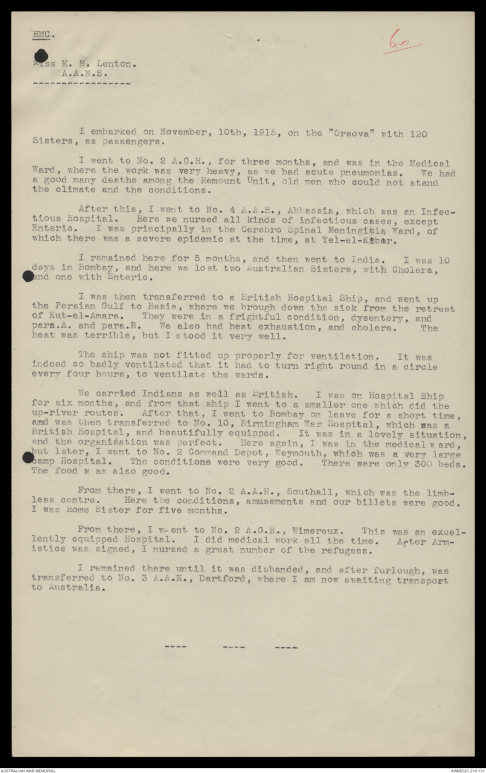
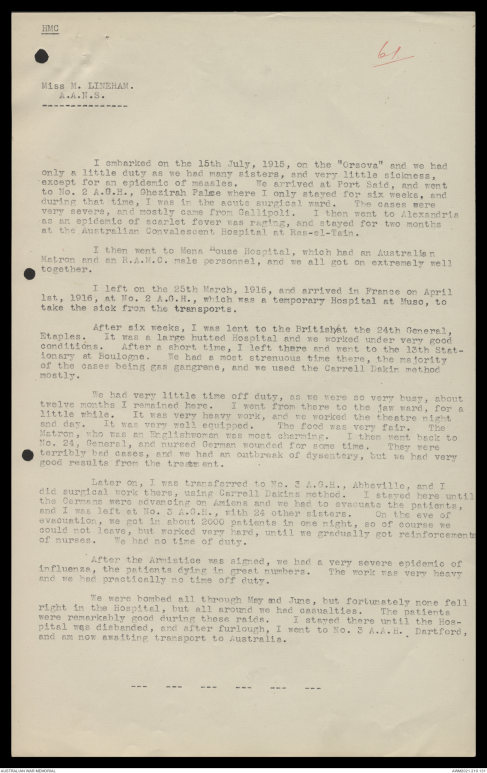
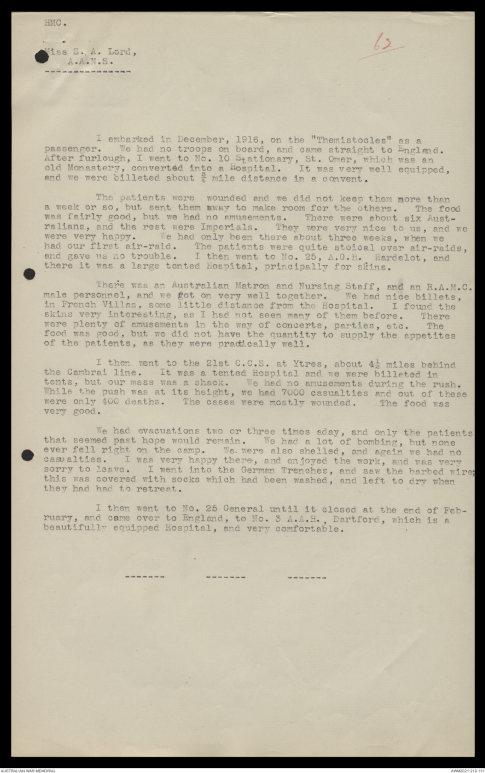
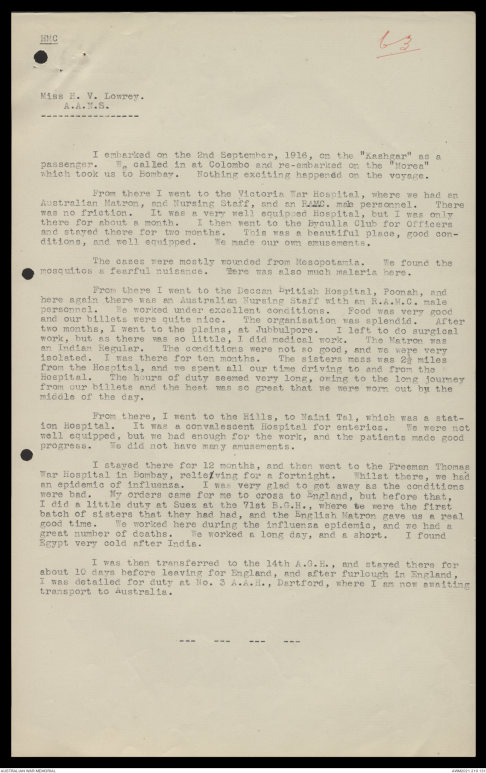
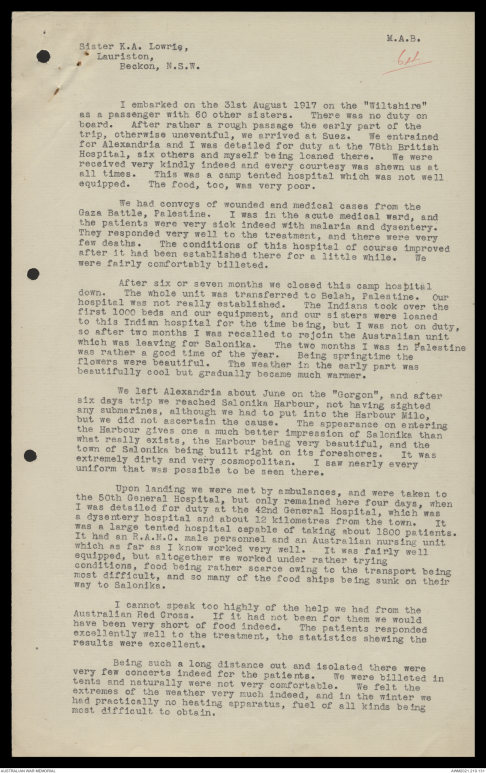
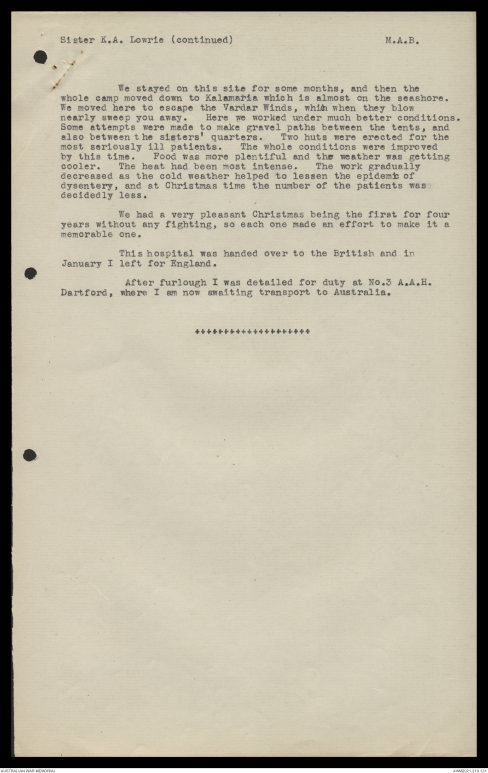
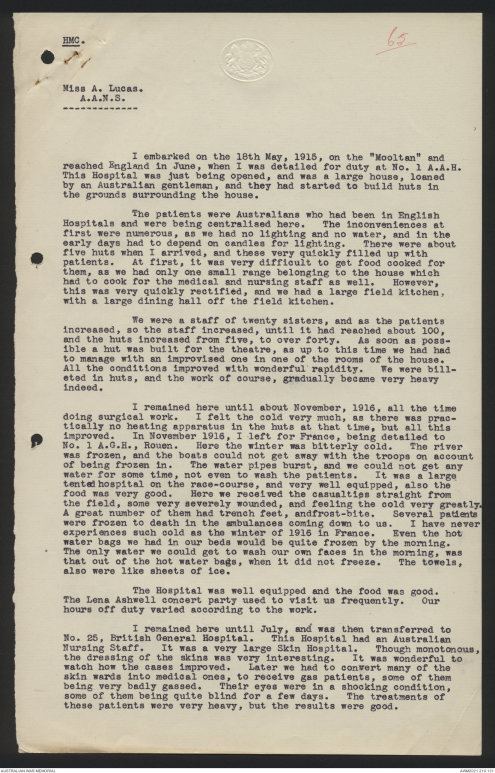
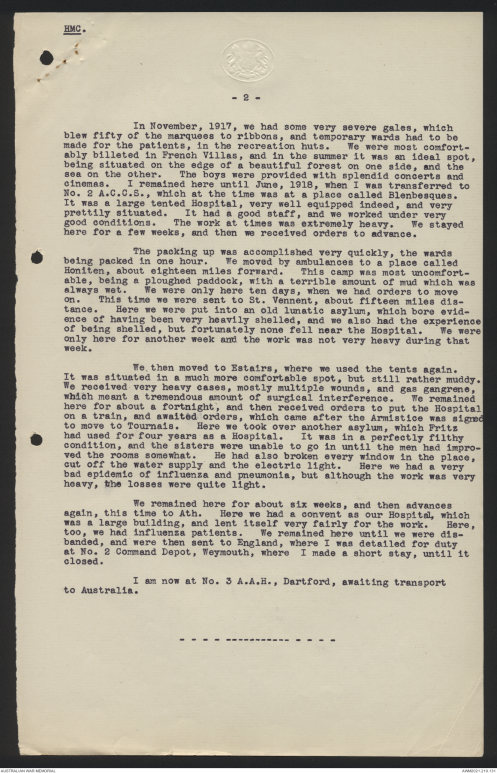
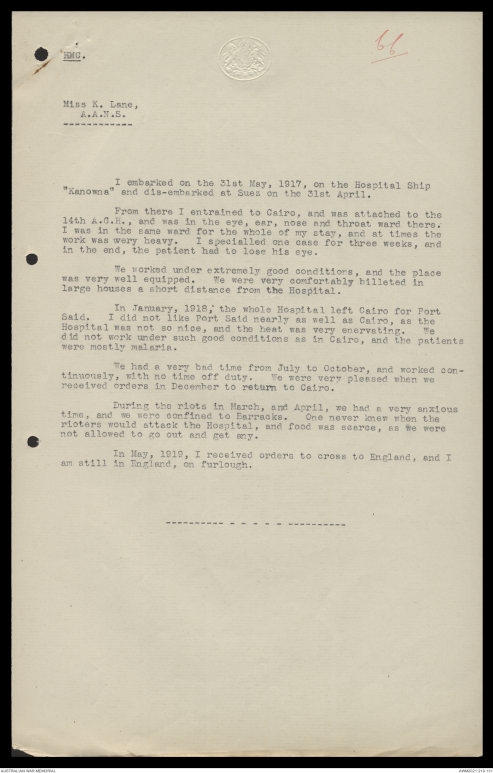
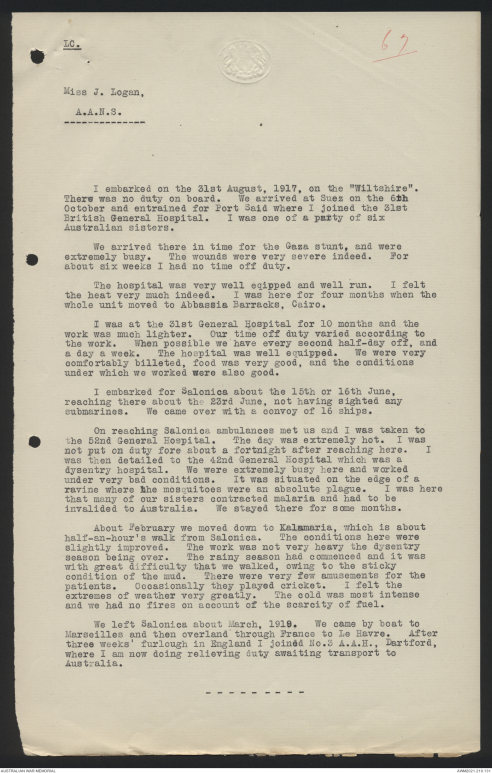
HMC. 60
Miss M. M. Lenton.
A.A.N.S.
I embarked on November, 10th, 1915, on the "Orsova" with 120
Sisters, as passengeers.
I went to No. 2 A.C.H. for three months, and was in the Medical
Ward, where the work was very heavy, as we had acute pneumonias. We had
a good many deaths among the Remount Unit, old men who could not stand
the climate and the conditions.
After this, I went to No. 4 A.A.H., Abbassia, which was an Infectious
Hospital. Here we nursed all kinds of infectious cases, except
Enteric. I was principally in the Cerebro Spinal Meningitis Ward, of
which there was a severe epidemic at the time, at Tel-el-Kiber.
I remained here for 5 months, and then went to India. I was 10
days in Bombay, and here we lost two Australian Sisters, with Cholera,
and one with Enteric.
I was then transferred to a British Hospital Ship, and went up
the Persian Gulf to Basia, where we brough down the sick from the retreat
of Kut-el-Amara. They were in a frightful condition, dysentery, and
pars.A. and pars.B. We also had heat exhaustion, and cholera. The
heat was terrible, but I stood it very well.
The ship was not fitted up properly for ventilation. It was
indeed so badly ventilated that it had to turn right round in a circle
every four hours, to ventilate the wards.
We carried Indians as well as British. I was on Hospital Ship
for six months, and from that ship I went to a smaller one which did the
up-river routes. After that, I went to Bombay on leave for a short time,
and was then transferred to No. 10, Birmingham War Hospital, which was a
British Hospital, and beautifully equipped. It was in a lovely situation,
and the organisation was perfect. Here again, I was in the medical ward,
but later, I went to No. 2 Command Depot, Weymouth, which was a very large
camp Hospital. The conditions were very good. There were only 300 beds.
The food was also good.
From there, I went to No. 2 A.A.H., Southall, which was the limbless
centre. Here the conditions, amusements and our billets were good.
I was Home Sister for five months.
From there, I went to No. 2 A.G.H., Wimereux. This was an excellently
equipped Hospital. I did medical work all the time. After Armistice
was signed, I nursed a great number of the refugees.
I remained there until it was disbanded, and after furlough, was
transferred to No. 3 A.A.H., Dartford, where I am now awaiting transport to Australia.
HMC 61
Miss M. LINEHAM.
A.A.N.S.
I embarked on the 15th July, 1915, on the "Orsova" and we had
only a little duty as we had many sisters, and very little sickness,
except for an epidemic of measles. We arrived at Port Said, and went
to No. 2 A.G.H., Ghezirah Palace where I only stayed for six weeks, and
during that time, I was in the acute surgical ward. The cases were
very severe, and mostly came from Gallipoli. I then went to Alexandria
as an epidemic of scarlet fever was raging, and stayed for two months
at the Australian Convalescent Hospital at Ras-el-Tain.
I then went to Mena House Hospital, which had an Australian
Matron and an R.A.M.C. male personnel, and we all got on extremely well together.
I left on the 25th March, 1916, and arrived in France on April
1st, 1916, at No. 2 A.G.H., which was a temporary Hospital at Muso, to
take the sick from the transports.
After six weeks, I was lent to the British at the 24th General,
Etaples. It was a large hutted Hospital and we worked under very good
conditions. After a short time, I left there and went to the 13th Stationary
at Boulogne. We had a most strenuous time there, the majority
of the cases being gas gangrene, and we used the Carrell Dakin method
mostly.
We had very little time off duty, as we were so very busy, about
twelve months I remained here. I went from there to the jaw ward, for a
little while. It was very heavy work, and we worked the theatre night
and day. It was very well equipped. The food was very fair. The
Matron, who was an Englishwoman was most charming. I then went back to
No. 24, General, and nursed German wounded for some time. They were
terribly bad cases, and we had an outbreak of dysentery, but we had very
good results from the treatment.
Later on, I was transferred to No. 3 A.G.H., Abbeville, and I
did surgical work there, using Carrell Dakins method. I stayed here until
the Germans were advancing on Amiens and we had to evacuate the patients,
and I was left at No. 3 A.G.H., with 24 other sisters. On the eve of
evacuation, we got in about 2000 patients in one night, so of course we
could not leave, but worked very hard, until we gradually got reinforcements
of nurses. We had no time of duty.
After the Armistice was signed, we had a very severe epidemic of
influenza, the patients dying in great numbers. The work was very heavy
and we had practically no time off duty.
We were bombed all through May and June, but fortunately none fell
right in the Hospital, but all around we had casualties. The patients
were remarkably good during these raids. I stayed there until the Hospital
was disbanded, and after furlough, I went to No. 3 A.A.H., Dartford,
and am now awaiting transport to Australia.
HMC. 62
Miss S.A. Lord,
A.A.N.S.
I embarked in December, 1916, on the "Themistocles" as a
passenger. We had no troops on board, and came straight to England.
After furlough, I went to No. 10 Stationary, St. Omer, which was an
old Monastery, converted into a Hospital. It was very well equipped,
and we were billeted about ¾ mile distance in a convent.
The patients were wounded and we did not keep them more than
a week or so, but sent them away to make room for the others. The food
was fairly good, but we had no amusements. There were about six Australians,
and the rest were Imperials. They were very nice to us, and we
were very happy. We had only been there about three weeks, when we
had our first air-raid. The patients were quite stoical over air-raids,
and gave us no trouble. I then went to No. 25, A.G.H. Hardelot, and
there it was a large tented hospital, principally for skins.
There was an Australian Matron and Nursing Staff, and an R.A.M.C.
male personnel, and we got on very well together. We had nice billets,
in French Villas, some little distance from the Hospital. I found the
skins very interesting, as I had not seen many of them before. There
were plenty of amusements in the way of concerts, parties, etc. The
food was good, but we did not have the quantity to supply the appetites
of the patients, as they were practically well.
I then went to the 21st C.C.S. at Ytres, about 4½ miles behind
the Cambrai line. It was a tented Hospital and we were billeted in
tents, but our mess was a shack. We had no amusements during the rush.
While the push was it its height, we had 7000 casualties and out of these
were only 400 deaths. The cases were mostly wounded. The food was
very good.
We had evacuations two or three times a day, and only the patients
that seemed past hope would remain. We had a lot of bombing, but none
ever fell right on the camp. We were also shelled, and again we had no
casualties. I was very happy there, and enjoyed the work, and was very
sorry to leave. I went into the German Trenches, and saw the barbed wire;
this was covered with socks which had been washed, and left to dry when
they had had to retreat.
I then went to No. 25 General until it closed at the end of February,
and came over to Engand, to No. 3 A.A.H, Dartford, which is a
beautifully equipped Hospital, and very comfortable.
63
HMC
Miss A.V. Lowrey,
A.A.N.S.
I embarked on the 2nd September, 1916, on the “Kashgar” as a
passenger. We called in at Colombo and re-embarked on the “Morea”
which took us to Bombay. Nothing exciting happened in the voyage.
From there I went to the Victoria Tar Hospital, where we had an
Australian Matron, and Nursing Staff, and an RAMC. male personnel. There
was no friction. It was a very well equipped Hospital, but I was only
there for about a month. I then went to the Bydulla Club for Officers
and stayed there for two months. This was a beautiful place, good conditions,
and well equipped. We made our own amusements.
The cases were mostly wounded from Mesopotamia. We found the
mosquitos a fearful nuisance. There was also much maleria here.
From there I went to the Deccan British Hospital, Poonah, and
here again there was an Australian Nursing Staff with an R.A.M.C. male
personnel. He worked under excellent conditions. Food was very good
and our billets were quite nice. The organisation was splendid. After
two months, I went to the plains, at Jubbulpore. I left to do surgical
work, but as there was so little, I did medical work. The Matron was
an Indian Regular. The conditions were not so good, and we were very
isolated. I was there for ten months. The sisters mess was 2 1/2 miles
from the Hospital, and we spent all our time driving to and from the
Hospital. The hours of duty seemed very long, owing to the long journey
from our billets and the best was so great that we were worn out by the
middle of the day.
From there, I went to the Hills, to Naini Tel, which was a station
hospital. It was a convalescent Hospital for enteries. We were not
well equipped, but we had enough for the work, and the patients made good
progress. We did not have many amusements.
I stayed there for 12 months, and then went to the Freemen Thomas
War Hospital in Bombay, relieiving for a fortnight. Whilst there, we had
an epidemic of influenza. I was very glad to get away as the conditions
were bad. My orders came for me to cross to England, but before that,
I did a little duty at Suez at the 71st B.G.H., where we were the first
batch of sisters that they had had, and the English Matron gave us a real
good time. We worked here during the influenza epidemic, and we had a
great number of deaths. We worked a long day, and a short. I found
Egypt very cold after India.
I was then transferred to the 14th A.G.H., and stayed there for
about 10 days before leaving for England, and after furlough in England,
I was detailed for duty at No. 3 A.A.H., Dartford, where I am now awaiting
transport to Australia.
M.A.B. 64
Sister K.A. Lowrie,
Lauriston,
Beckon, N.S.W.
I embarked on the 31st August 1917 on the "Wiltshire"
as a passenger with 60 other sisters. There was no duty on
board. After rather a rough passage the early part of the
trip, otherwise uneventful, we arrived at Suez. We entrained
for Alexandria and I was detailed for duty at the 78th British
Hospital, six others and myself being loaned there. We were
received very kindly indeed and every courtesy was shown us at
all times. This was a camp tented hospital which was not well
equipped. The food, too, was very poor.
We had convoys of wounded and medical cases from the
Gaza Battle, Palestine. I was in the acute medical ward, and
the patients were very sick indeed with malaria and dysentery.
They responded very well to the treatment, and there were very
few deaths. The conditions of this hospital of course improved
after it had been established there for a little while. We
were fairly comfortable billeted.
After six or seven months we closed this camp hospital
down. The whole unit was transferred to Belah, Palestine. Our
hospital was not really established. The Indians took over the
first 1000 beds and our equipment, and our sisters were loaned
to this Indian hospital for the time being, but I was not on duty,
so after two months I was recalled to rejoin the Australian unit
which was leaving for Salonika. The two months I was in Palestine
was rather a good time of the year. Being springtime the
flowers wer beautiful. The weather in the early part was
beautifully cool but gradually became much warmer.
We left Alexandria about June on the "Gorgon", and after
six days trip we reached Salonika Harbour, not having sighted
any submarines, although we had to put into the Harbour Mile,
but we did not ascertain the cause. The appearance on entering
the Harbour gives one a much better impression of Salonika than
what really exists, the Harbour being very beautiful, and the
town of Salonika being built right on its foreshores. It was
extremely dirty and very cosmopolitan. I saw nearly every
uniform that was possible to be seen there.
Upon landing we were met by ambulances, and were taken to
the 50th General Hospital, but only remained here four days, when
I was detailed for duty at the 42nd General Hospital, which was
a dysentry hospital and about 12 kilometres from the town. It
was a large tented hospital capable of taking about 1800 patients.
It had an R.A.N.C. male personnel and an Australia nursing unit
which as far as I know worked very well. It was fairly well
equipped, but altogether we worked under rather trying
conditions, food being rather scarce owing to the transport being
most difficult, and so many of the food shops being sunk on their
way to Salonika.
I cannot speak too highly of the help we had from the
Australian Red Cross. If it had not been for them we would
have been very short of food indeed. The patients responded
excellently well to the treatment, the statistics showing the
results were excellent.
Being such a long distance out and isolated there were
very few concerts indeed for the patients. We were billeted in
tents and naturally were not very comfortable. We felt the
extremes of the weather very much indeed, and in the winter we
had practically no heating apparatus, fuel of all kinds being
most difficult to obtain.
M.A.B.
Sister K.A. Lowrie (continued)
We stayed on this site for some months, and then the
whole camp moved down to Kalamaria which is almost on the seashore.
We moved here to escape the Vardar Winds, which when they blow
nearly sweep you away. Here we worked under much better confitions.
Some attempts were made to make gravel paths between the tents, and
also between the sisters' quarters. Two huts were erected for the
most seriously ill patients. The whole conditions were improved
by this time. Food was more plentiful and the weather was getting
cooler. The heat had been most intense. The work gradually
descreased as the cold weather helped to lessen the epidemic of
dysentery, and at Christmas time the number of the patients was
decidedly less.
We had a very pleasant Christmas being the first for four
years without any fighting, so each one made an effort to make it a
memorable one.
This hospital was handed over to the British and in
January I left for England.
After furlough I was detailed for duty at No. 3 A.A.H.
Dartford, where I am now awaiting transport to Australia.
HMC. 65
Miss A. Lucas.
A.A.N.S.
I embarked on the 18th May, 1915, on the "Mooltan" and
reached England in June, when I was detailed for duty at No. 1 A.A.H.
This Hospital was just being opened, and was a large house, loaned
by an Australian gentleman, and they had started to build huts in
the grounds surrounding the house.
The patients were Australians who had been in English
Hospitals and were being centralised here. The inconveniences at
first were numerous, as we had no lighting and no water, ad in the
early days had to depend on candles for lighting. There was about
five huts when I arrived, and these very quickly filled up with
patients. At first, it was very difficult to get food cooked for
them, as we had only one small range belonging to the house which
had to cook for the medical and nursing staff as well. However,
this was very quickly rectified, and we had a large field kitchen,
with a large dining hall off the field kitchen.
We were a staff of twenty sisters, and as the patients
increased, so the staff increased, until it had reached about 100,
and the huts increased from five, to over forty. As soon as possible
a hut was built for the theatre, as up to this time we had had
to manage with an improvised one in one of the rooms of the house.
All the conditions improved with wonderful rapidity. We were billeted
in huts, and the work of course, gradually became very heavy
indeed.
I remained here until about November, 1916, all the time
doing surgical work. I felt the cold very much, as there was practically
no heating apparatus in the huts at that time, but all this
improved. In November 1916 I left for France, being detailed to
No. 1 A.G.H. , Rouen. Here the winter was bitterly cold. The river
was frozen, and the boats could not get away with the troops on account
of being frozen in. The water pipes burst, and we could not get any
water for some time, not even to wash the patients. It was a large
tented hospital on the race-course, and very well equipped, also the
food was very good. Here we received the casualties straight from
the field, some very severely wounded, and feeling the cold very greatly.
A great number of them had trench feet, and frost-bite. Several patients
were frozen to death in the ambulances coming down to us. I have never
experiences such cold as the winter of 1916 in France. Even the hot
water bags we had in our beds would be quite frozen by the morning.
The only water we could get to wash our own faces in the morning, was
that out of the hot water bags, when it did not freeze. The towels,
also were like sheets of ice.
The Hospital was well equipped and the food was good.
The Lena Ashell concert party used to visit us frequently. Our
hours off duty varied according to the work.
I remained here until July, and was then transferred to
No. 25, British General Hospital. This Hospital had an Australian
Nursing Staff. It was a very large Skin Hospital. Though monotonous,
the dressing of the skins was very interesting. It was wonderful to
watch how the cases improved. Later we had to convert many of the
skin wards into medical ones, to receive gas patients, some of them
being very badly gassed. Their eyes were in a shocking condition,
some of them being quite blind for a few days. The treatments of
these patients were very heavy, but the results were good.
HMC>
-2-
In November, 1917, we had some very sever gales, which
blew fifty of the marquees to ribbons, and temporary wards had to be
made for the patients, in the recreation huts. We were most comfortably
billeted in French Villas, and in the summer it was an ideal sport,
being situation on the edge of a beautiful forest on one side, and the
sea on the other. The boys were provided with splendid concerts and
cinemas. I remained here until June, 1918, when I was transferred to
No. 2 A.C.C.S., which at the time was at a place called Blenbesques.
It was a large tented Hospital, very well equipped indeed, and very
prettily situation. It had a good staff, and we worked under very
good conditions. The work at times was extremely heavy. We stayed
here for a few weeks, and then we received orders to advance.
The packing up was accomplished very quickly, the wards
being packed in one hour. We moved by ambulances to a place called
Honiten, about eighteen miles forward. This camp was most uncomfortable,
being a ploughed paddock, with a terrible amount of mud which was
always wet. We were only here ten days, when we had orders to move
on. This time we were sent to St. Vennent, about fifteen miles distance.
Here we were put into an old lunatic asylum, which bore evidence
of having been very heavily shelled, and we also had the experience
of being shelled, but fortunately none fell near the Hospital. We were
only here for another week and the work was not very heavy during that
week.
We then moved to Estairs, where we used the tents again.
It was situated in a much more comfortable spot, but still rather muddy.
We received very heavy cases, mostly multiple wounds, and gas gangrene,
which meant a tremendous amount of surgical interference. We remained
here for about a fortnight, and then received orders to put the Hospital
on a train, and awaited orders, which came after the Armistice was signed
to move to Tournais. Here we took over another asylum, which Fritz
had used for four years as a Hospital. It was in a perfectly filthy
condition, and the sisters were unable to go in until the men had improved
the rooms somewhat. He had also broken every window in the place,
cut off the water supply and the electric light. Here we had a very
bad epidemic of influenza and pneumonia, but although the work was very
heavy, the losses were quite light.
We remained here for about six weeks, and then advances
again, this time to Ath. Here we had a convent as our Hospital, which
was a large building, and lent itself very fairly for the work. Here,
too, we had influenza patients. We remained here until we were disbanded,
and were then sent to England, where I was detailed for duty
at No. 2 Command Depot, Weymouth, where I made a short stay, until it
closed.
I am now at No. 3 A.A.H., Dartford, awaiting transport
to Australia.
HMC. 66
Miss K. Lane,
A.A.N.S.
I embarked on the 31st May, 1917, on the Hospital Ship
"Kanowa" and dis-embarked at Suez on the 31st April.
From there I entrained to Cairo, and was attached to the
14th A.G.H., and was in the eye, ear, nose and throat ward there.
I was in the same ward for the whole of my stay, and at times the
work was very heavy. I specialled one case for three weeks, and
in the end, the patient had to lose his eye.
We worked under extremely good conditions, and the palce
was very well equipped. We were very comfortable billeted in
large house a short distance from the Hospital.
In January, 1918, the whole Hospital left Cairo for Fort
Said. I did not like Fort Said nearly as well as Cairo, as the
Hospital was not so nice, and the heat was very enervating. We
did not work under such good conditions as in Cairo, and the patients
were mostly malaria.
We had a very bad time from July to October, and worked continuously,
with not time off duty. We were very pleased when we
received orders in December to return to Cairo.
During the riots in March, and April, we had a very anxious
time, as we were confined to Barracks. One never knew when the
rioters would attack the Hospital, and food was scarce, as we were
not allowed to go out and get any.
In May, 1919, I received order to cross to England, and I
am still in England, on furlough.
LC. 67
Miss J. Logan,
A.A.N.S.
I embarked on the 31st August, 1917, on the "Wiltshite'.
There was no duty on board. We arrived at Suez on the 6th
October and entrained for Port Said where I joined the 31st
British General Hospital. I was one of a party of six
Australian sisters.
We arrived there in time for the Gaza stunt, and were
extremely busy. The wounds were very severe indeed. For
about six weeks I had no time off duty.
The hospital was very well eqipped and well run. I felt
the heat very much indeed. I was here for four months when the
while unit moved to Abbassia Barracks, Cairo.
I was at the 31st General Hospital for 10 months and the
work was much lighter. Our time off duty varied according to
the work. When possible we have every second half-day off, and
a day a week. The hospital was well equipped. We were very
comfortably billeted, food was very good, and the conditions
under which we worked were also good.
I embarked for Salonica about the 15th or 16th June,
reaching there about the 23rd June, not having sighted any
submarines. We came over with a convoy of 16 ships.
On reach Salonica ambulances met us and I was taken to
the 52nd General Hospital. The day was extremely hot. I was
not put on duty fore about a fortnight after reaching here. I
was then detailed to the 42nd General Hospital which was a
dysentery hospital. We were extremely busy here and worked
under very bad conditions. It was situated on the edge of a
ravine where the mosquitoes were an absolute plague. I was here
that many of our sisters contracted malaria and had to be
invalided to Australia. We stayed there for some months.
About February we moved down to Kalamaria, which is about
half-an-hour's walk from Salonica. The conditions here were
slightly improved. The work was not very heavy the dysentry
season being over. The rainy season had commenced and it was
with great difficulty that we walkedm owing to the sticky
condition of the mud. There were very few amusements for the
patients. Occasionally they played cricket. I felt the
extremes of weather vary greatly. The cold was most intense
and we had no fires on account of the scarcity of fuel.
We left Salonica about March, 1919. We came by boat to
Marselles and then overland through France to Le Havre. After
three weeks' furlough in England I joined No. 3 A.A.H., Dartford,
where I am now doing relieving duty awaiting transport to
Australia.
 Sam scott
Sam scottThis transcription item is now locked to you for editing. To release the lock either Save your changes or Cancel.
This lock will be automatically released after 60 minutes of inactivity.